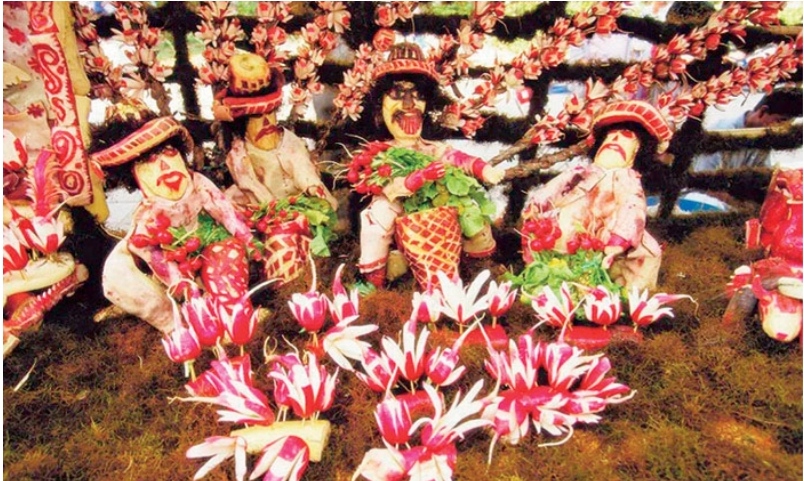Christmas traditions – celebrated around the world

From Krampus to a KFC – fueled Christmas, here’s a look at some of the world’s most fascinating holiday traditions.Countries around the world have unique end-of-year customs they’ve practiced for decades or even centuries. For instance, several Central European countries honour St. Nick’s evil counterpart, Krampus, a supernatural figure charged with punishing bad children by leaving lumps of coal in their Christmas stockings or whacking them with a birch switch.
Japan has its own special Christmas traditions, shaped in part by none other than Kentucky Fried Chicken. In the early 1970s, KFC kicked off an advertising campaign touting fried fowl as America’s favorite holiday meal. Special yuletide packaging and Santa hats on the statues of Colonel Sanders outside restaurants reinforced the message. Today, KFC Japan’s highest sales occur during the festive season, according to the Daily Mail.

While some traditions may be unfamiliar to people in the U.S., they’re well-loved customs for those who celebrate them around the world. It just goes to show that Christmas comes in all shapes and sizes. Here’s a look at some of our favorites.
Krampus, Central Europe
St. Nick’s devil-like counterpart, Krampus — celebrated throughout Germany, Austria, Czechia, Slovenia, and Hungary — has one task: to punish bad children before the feast of St. Nicholas on December 6. Picture a frightening half-goat demon figure, often seen with fur and horns. And instead of carrying a bag full of toys, he has a basket or sack for abducting especially naughty children and hauling them back to hell. You can experience this holiday tradition at Krampusnacht parades and parties, during which rowdy revelers cavort around town in beastly costumes.
Beach Parties, Australia
Evergreen trees and white, snowy landscapes may be some people’s idea of a perfect Christmas, but that’s not the case in Australia, where December 25 falls in the middle of summer. On the bright side, the warm weather does make it the perfect time to throw a yuletide beach party. Another popular tradition is Carols by Candlelight, where people light candles and sing holiday songs in parks and other outdoor venues. As Atlas Obscura reported, Santa sometimes even makes an appearance on the beach in Mooloolaba, Queensland, in a boat or via parasail, to hand out candy to all the kiddos. Kentucky Fried Chicken, Japan
Traditional holiday dinner for millions of people in Japan means a bucket of KFC. While Christmas itself isn’t really a religious holiday since most people in the country do not identify as Christian, it’s still a fun secular celebration. The offbeat custom is the legacy of a 1974 marketing campaign wherein the fast-food chain touted fried chicken as a traditional American yuletide feast.
Even today, in the weeks leading up to the holiday, Colonel Sanders statues outside KFC outposts all over Japan wear Santa gear, while the chicken itself is served in special holiday packaging. Who is that swooping down the chimney? Similar to Santa Claus, an old witch named La Befana flies around on her broomstick and brings good Italian children treats (and bad Italian children, coal) on Epiphany Eve.
According to the Italian Ministry of Tourism, the roots of this legend can be traced back to pre-Roman times, when similar mythical flying women were associated with the harvest, but became connected to the story of the three wise men visiting baby Jesus. The legend is celebrated on January 6 with events across the country, including the Regata delle Befane in Venice, a boat race featuring costumed participants.
Yule Lads, Iceland
Iceland has several unique Christmas traditions, ranging from the “Christmas Book Flood,” when everyone receives at least one book for Christmas, to the baking of customary leaf bread. The Yule Lads are rooted in Icelandic folklore. During the 13 days leading up to Christmas, little ones put their shoes out each night, and in the morning, they’ll find a small present from these 13 mountain trolls if they’ve been good — or a potato, in lieu of a lump of coal, if they’ve been bad. Another seasonal character, the Yule Cat, has been depicted as the Lads’ pet since the last century, according to the University of Iceland’s Icelandic Folklore website. The legendary creature has been rumored to eat naughty, lazy children who don’t receive new clothes for Christmas (a common reward for well-behaved kids who do their chores).
Single Women Tossing Shoes, Czechia
According to the Czech Tourism Authority, unmarried women will toss a shoe over their shoulder on Christmas Day, while facing away from an open door, to predict whether or not their romantic prospects will change in the next year. If it lands with the toe pointing toward the door, the woman will marry; if not, she’ll have to embrace single life for at least another year.
Night of the Radishes, Mexico
December 23 marks the Night of the Radishes in Oaxaca, Mexico, a celebration of oversized radishes, which are carved into intricate displays. According to How Stuff Works, the annual Christmas market event began in 1897 when vendors carved radishes with detailed designs to attract customers and a contest was held to honor the most creative figures. That tradition continues today. The Gävle Goat, Sweden
Some say this tradition goes back to local Swedish legends about Christmas elves riding the Yule Goat door-to-door to deliver presents, similar to Santa Claus. Researchers at the Carnegie Museum of Natural History have also traced it to ancient pagan festivals honoring the Norse god, Thor, whose chariot was pulled by goats. According to Gävle’s official tourism website, the town constructed an epic version of the Yule Goat in 1966 to promote local tourism.
Constructed of wood, rope, and straw, it’s roughly the height of a three-story house. To this day, it goes up on the first Sunday of Advent each year, and despite the presence of stationed guards, cameras, and fences, it usually gets destroyed before Christmas — so often, the Canadian Broadcasting Corporation reported, that locals will bet on whether or not it’ll make it through the whole season.




